#bank loan application
Text
I have had to make so many of these posts this year...
Yeah, I desperately need help with money again. It's not as insane as last month, but it's still... not great. The bullet points:
I haven't worked at my regular job since February
my current employer approved my medical leave but the state keeps giving me the runaround with paperwork regarding getting any money while I'm out of work I have sent in my paperwork to the state, and now they will take “several weeks” to decide if they’re going to pay me for short term disability
I get $25 a week from my current employer - I don't see a single penny because it all goes to taxes before it hits my account
I DoorDash as much as I can, but it barely pays for its own gas let alone bills, and I'm so burnt out every single day
I am actively applying for (less physical) jobs but because of my lack of office experience I'm either not getting a response at all or I'm getting rejected after one or two interviews
I have an appointment with my cardiologist tomorrow, hopefully I will have a clearer timeline than what I've had so far
currently I am not returning to work until the last week of June, but that will most likely change and I'm terrified it's going to be later than that
according to my cardiologist, I will be out of work until at least August 2024, she is encouraging me to apply for permanent disability benefits as it is becoming too hard on my body to do any kind of work
the first ~$400 will go toward paying rent this month, everything else will go toward getting my other account out of the red again and gas
How you can help:
paypal
etsy shop
venmo: amwallace95
reblog this to help spread the word! (please)
so far:
88/1000
#alex says things#mutual aid#crowdfunding#isn't it great not being able to afford being alive?#anyway thank god my bank understands so i can pause loan payments on my car#hopefully#i have to fill out the application
66 notes
·
View notes
Note
DCSHG Hal Jordan is so... Him. Like oh my god he's such a fucking idiot
Like- Diana's first instinct to meeting him was to throw him all the way across Metropolis. He broke up with Carol on Valentine's day then got upset she moved on. He got possessed by plants this one time and then got locked in a broom closet for the rest of the weekend. He became a lead singer in a boy band to save Kara... He's just so-
DCSHG hal is somehow like the perfect happy medium between 70s hal and goeff's hal, it's insane. The scene where he wants to be friends with clark so bad and he's really annoying about it DCSHG gets it fr
#asks <3#ty for the ask!!#everyday i think about clark just fucking ignoring hal's calls#and that time when hal apologized to clark for CLARK breaking into hal's apartment and yelling at him like girl get a SPINE#i think the problem with hal is that he is just too honest and also everything in his life is always going wrong#so when you go hey hal hows it been just to be polite you get a two hour conversation about how the bank declined his loan application agai
38 notes
·
View notes
Text
Ready to buy a car but torn between bank or dealer financing? Discover the ultimate showdown of pros and cons in our engaging guide! Make the smartest choice and drive away with the best deal. Don’t miss out—read now and secure your dream car effortlessly!
#Car loan options#Auto financing#Loan interest rates#Vehicle financing#Auto loan terms#Bank loan advantages#Dealer financing benefits#Car dealership financing#Personal loans for cars#Auto loan approval process#Credit score impact#Financing incentives#Loan comparison#Financing deals#Auto loan repayment#Down payment options#APR comparison#Loan flexibility#Financing discounts#Purchase vs. lease#Loan pre-approval#Auto finance advice#Negotiating car loans#Financial institutions#Loan application process
0 notes
Text
Women's Not So Distant History
This #WomensHistoryMonth, let's not forget how many of our rights were only won in recent decades, and weren’t acquired by asking nicely and waiting. We need to fight for our rights. Here's are a few examples:

📍 Before 1974's Fair Credit Opportunity Act made it illegal for financial institutions to discriminate against applicants' gender, banks could refuse women a credit card. Women won the right to open a bank account in the 1960s, but many banks still refused without a husband’s signature. This allowed men to continue to have control over women’s bank accounts. Unmarried women were often refused service by financial institutions entirely.
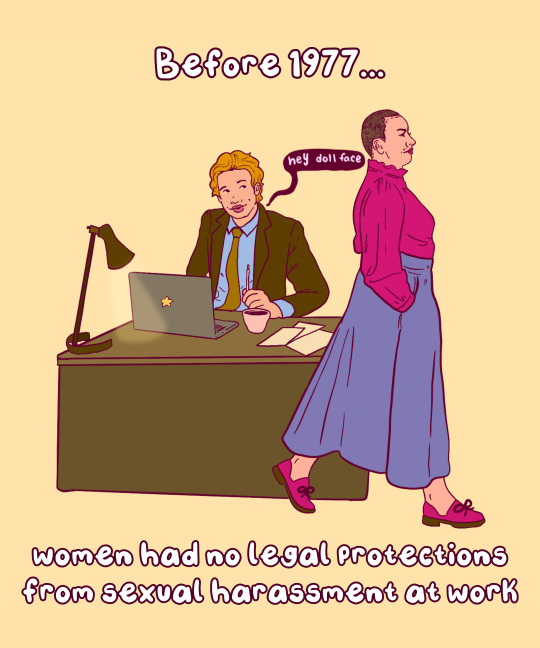
📍 Before 1977, sexual harassment was not considered a legal offense. That changed when a woman brought her boss to court after she refused his sexual advances and was fired. The court stated that her termination violated the 1974 Civil Rights Act, which made employment discrimination illegal.⚖️
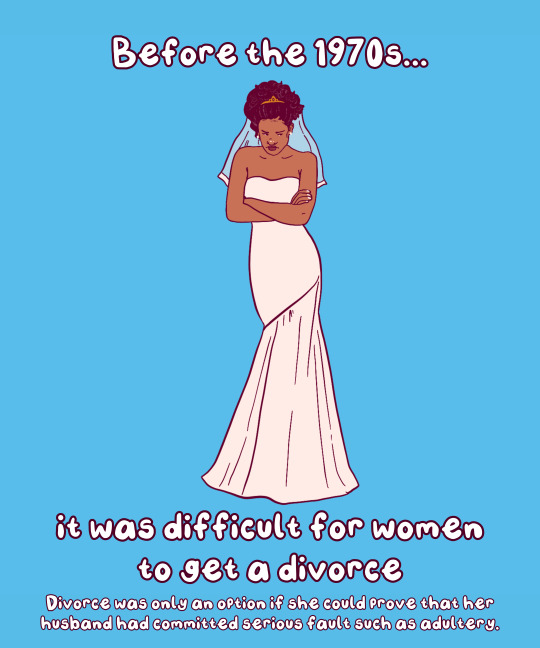
📍 In 1969, California became the first state to pass legislation to allow no-fault divorce. Before then, divorce could only be obtained if a woman could prove that her husband had committed serious faults such as adultery. 💍By 1977, nine states had adopted no-fault divorce laws, and by late 1983, every state had but two. The last, New York, adopted a law in 2010.

📍In 1967, Kathrine Switzer, entered the Boston Marathon under the name "K.V. Switzer." At the time, the Amateur Athletics Union didn't allow women. Once discovered, staff tried to remove Switzer from the race, but she finished. AAU did not formally accept women until fall 1971.

📍 In 1972, Lillian Garland, a receptionist at a California bank, went on unpaid leave to have a baby and when she returned, her position was filled. Her lawsuit led to 1978's Pregnancy Discrimination Act, which found that discriminating against pregnant people is unlawful

📍 It wasn’t until 2016 that gay marriage was legal in all 50 states. Previously, laws varied by state, and while many states allowed for civil unions for same-sex couples, it created a separate but equal standard. In 2008, California was the first state to achieve marriage equality, only to reverse that right following a ballot initiative later that year.

📍In 2018, Utah and Idaho were the last two states that lacked clear legislation protecting chest or breast feeding parents from obscenity laws. At the time, an Idaho congressman complained women would, "whip it out and do it anywhere,"

📍 In 1973, the Supreme Court affirmed the right to safe legal abortion in Roe v. Wade. At the time of the decision, nearly all states outlawed abortion with few exceptions. In 1965, illegal abortions made up one-sixth of all pregnancy- and childbirth-related deaths. Unfortunately after years of abortion restrictions and bans, the Supreme Court overturned Roe in 2022. Since then, 14 states have fully banned care, and another 7 severely restrict it – leaving most of the south and midwest without access.
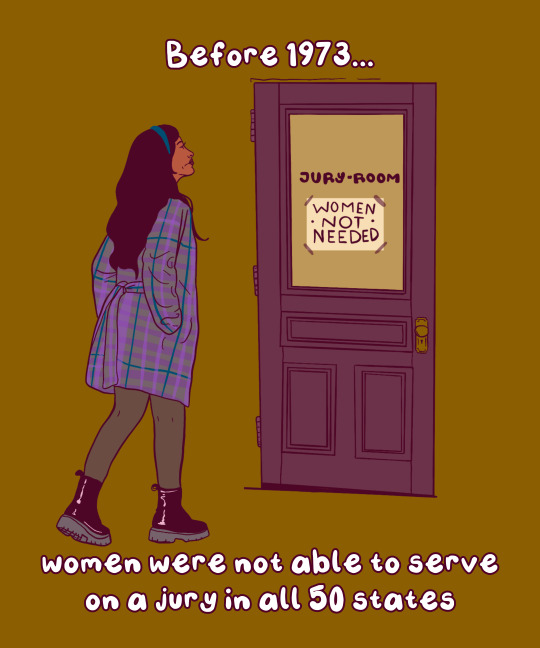
📍 Before 1973, women were not able to serve on a jury in all 50 states. However, this varied by state: Utah was the first state to allow women to serve jury duty in 1898. Though, by 1927, only 19 states allowed women to serve jury duty. The Civil Rights Act of 1957 gave women the right to serve on federal juries, though it wasn't until 1973 that all 50 states passed similar legislation

📍 Before 1988, women were unable to get a business loan on their own. The Women's Business Ownership Act of 1988 allowed women to get loans without a male co-signer and removed other barriers to women in business. The number of women-owned businesses increased by 31 times in the last four decades.
Free download

📍 Before 1965, married women had no right to birth control. In Griswold v. Connecticut (1965), the Supreme Court ruled that banning the use of contraceptives violated the right to marital privacy.

📍 Before 1967, interracial couples didn’t have the right to marry. In Loving v. Virginia, the Supreme Court found that anti-miscegenation laws were unconstitutional. In 2000, Alabama was the last State to remove its anti-miscegenation laws from the books.

📍 Before 1972, unmarried women didn’t have the right to birth control. While married couples gained the right in 1967, it wasn’t until Eisenstadt v. Baird seven years later, that the Supreme Court affirmed the right to contraception for unmarried people.
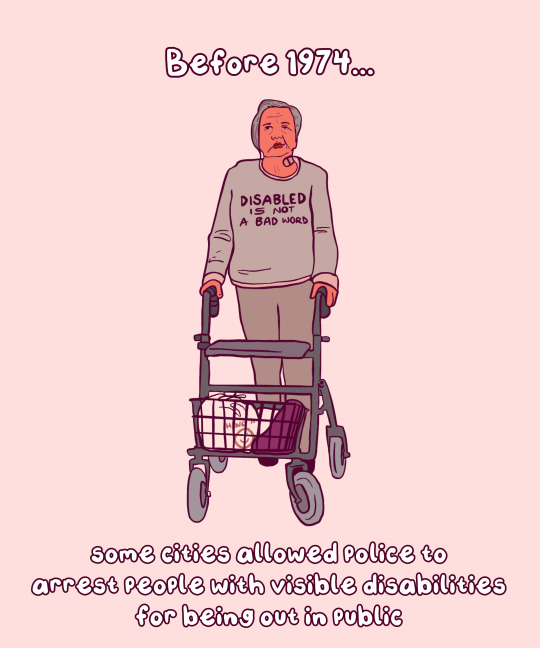
📍 In 1974, the last “Ugly Laws” were repealed in Chicago. “Ugly Laws” allowed the police to arrest and jail people with visible disabilities for being seen in public. People charged with ugly laws were either charged a fine or held in jail. ‘Ugly Laws’ were a part of the late 19th century Victorian Era poor laws.

📍 In 1976, Hawaii was the last state to lift requirements that a woman take her husband’s last name. If a woman didn’t take her husband’s last name, employers could refuse to issue her payroll and she could be barred from voting.

📍 It wasn’t until 1993 that marital assault became a crime in all 50 states. Historically, intercourse within marriage was regarded as a “right” of spouses. Before 1974, in all fifty U.S. states, men had legal immunity for assaults their wives. Oklahoma and North Carolina were the last to change the law in 1993.
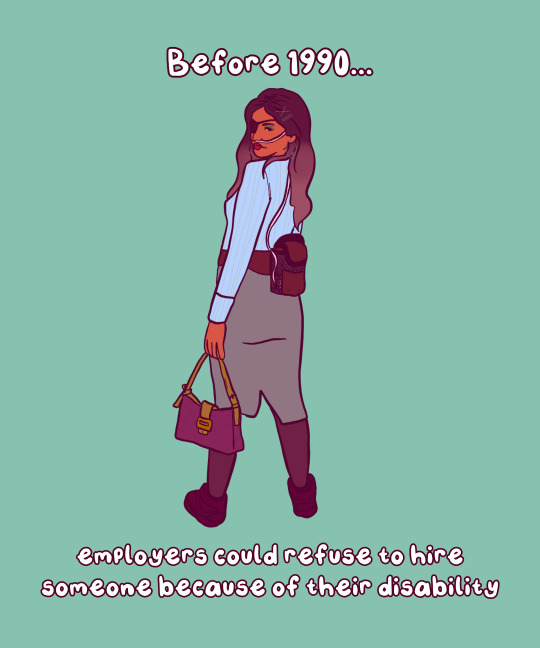
📍 In 1990, the Americans with Disability Act (ADA) – most comprehensive disability rights legislation in U.S. history – was passed. The ADA protected disabled people from employment discrimination. Previously, an employer could refuse to hire someone just because of their disability.
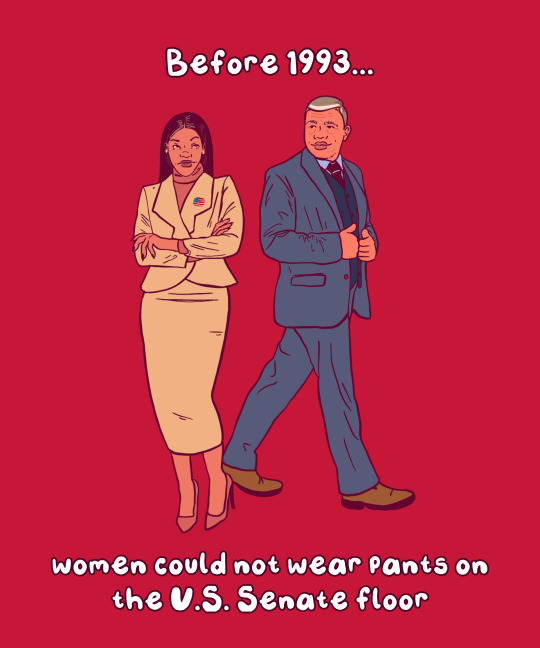
📍 Before 1993, women weren’t allowed to wear pants on the Senate floor. That changed when Sen. Moseley Braun (D-IL), & Sen. Barbara Mikulski (D-MD) wore trousers - shocking the male-dominated Senate. Their fashion statement ultimately led to the dress code being clarified to allow women to wear pants.

📍 Emergency contraception (Plan B) wasn't approved by the FDA until 1998. While many can get emergency contraception at their local drugstore, back then it required a prescription. In 2013, the FDA removed age limits & allowed retailers to stock it directly on the shelf (although many don’t).

📍 In Lawrence v. Texas (2003), the Supreme Court ruled that anti-cohabitation laws were unconstitutional. Sometimes referred to as the ‘'Living in Sin' statute, anti-cohabitation laws criminalize living with a partner if the couple is unmarried. Today, Mississippi still has laws on its books against cohabitation.
#art#feminism#women's history#women's history month#iwd2024#international women's day#herstory#educational#graphics#history#70s#80s#rights#women's rights#human rights
16K notes
·
View notes
Text
SMEDAN Sterling Bank Loan Application Guide for Business Owners (Get up to N2.5M For Your Business)
The Sterling Bank of Nigeria and the Small and Medium Enterprises Development Agency of Nigeria (SMEDAN) have partnered to launch a N5 billion loan program that is designed to empower small and medium-sized enterprises (SMEs) across Nigeria.
The SMEDAN Sterling Bank Loan is an offer of single-digit interest rates and flexible repayment terms, making it an attractive option for SMEs looking to…

View On WordPress
#CAC#Call for Applications#Grants#loan#naij#naija#NaijaBullet#Nigeria#SMEDAN#SMEDAN Sterling Bank Loan#Startup WISE Guys#Sustainability Acceleration Program#web3#Web3 Business Grant
0 notes
Text
#personal loan with maximum tenure#the lowest loan interest rate#personal loan interest rate of different banks#personal loan high interest rate#personal loan enquiry#personal loan with bank statement only#personal loan percentage#personal loan features#personal loans for employees#private loan interest rate#personal loan digital#top loan application#money online loan#instant personal app#loan private finance
0 notes
Text
Get Instant Loan - Quick Cash Now! Hassle-free Application. Approval in Minutes. No Collateral. Unlock Financial Freedom with Mpower Credcure. Call 7030489999.
#business loan low interest rate#Loan for New Company#Business In Rural Areas#application form for business loan#loans for small scale business#subsidy for business loan#quickest personal loan#best personal loan application#online loan apply personal loan#housing loan apply online#easy home loan bank#home loan process
0 notes
Text
Mortgage Payments Increased 17% Annually In July
The Mortgage Bankers Association Says Mortgage Payments Increased 17% Annually As Homebuyer Affordability Becomes More Challenging
The Mortgage Bankers Association says homebuyer affordability remained unchanged in July from June. However, mortgage payments increased 17% from last year.
The MBA’s Purchase Applications Payment Index (PAPI) measures how new monthly mortgage payments vary across…

View On WordPress
#banking#banks#debt#FHA loan applicants#foreclosure#foreclosure defense#foreclosures#homeowner affordability#increased mortgage payments#liens#MBA#mortgage bankers association#mortgage fraud#mortgage lending#mortgage payments#mortgages#PAPI#Purchase Applications Payment Index#real estate
0 notes
Text
The reason you can’t buy a car is the same reason that your health insurer let hackers dox you
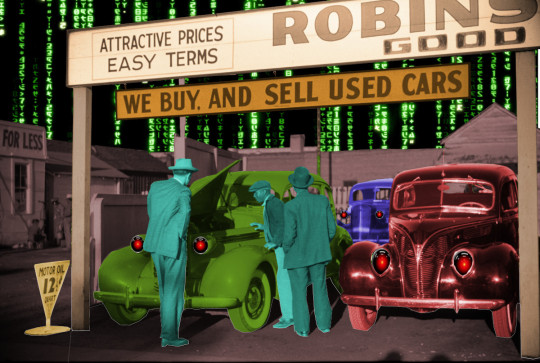
On July 14, I'm giving the closing keynote for the fifteenth HACKERS ON PLANET EARTH, in QUEENS, NY. Happy Bastille Day! On July 20, I'm appearing in CHICAGO at Exile in Bookville.

In 2017, Equifax suffered the worst data-breach in world history, leaking the deep, nonconsensual dossiers it had compiled on 148m Americans and 15m Britons, (and 19k Canadians) into the world, to form an immortal, undeletable reservoir of kompromat and premade identity-theft kits:
https://en.wikipedia.org/wiki/2017_Equifax_data_breach
Equifax knew the breach was coming. It wasn't just that their top execs liquidated their stock in Equifax before the announcement of the breach – it was also that they ignored years of increasingly urgent warnings from IT staff about the problems with their server security.
Things didn't improve after the breach. Indeed, the 2017 Equifax breach was the starting gun for a string of more breaches, because Equifax's servers didn't just have one fubared system – it was composed of pure, refined fubar. After one group of hackers breached the main Equifax system, other groups breached other Equifax systems, over and over, and over:
https://finance.yahoo.com/news/equifax-password-username-admin-lawsuit-201118316.html
Doesn't this remind you of Boeing? It reminds me of Boeing. The spectacular 737 Max failures in 2018 weren't the end of the scandal. They weren't even the scandal's start – they were the tipping point, the moment in which a long history of lethally defective planes "breached" from the world of aviation wonks and into the wider public consciousness:
https://en.wikipedia.org/wiki/List_of_accidents_and_incidents_involving_the_Boeing_737
Just like with Equifax, the 737 Max disasters tipped Boeing into a string of increasingly grim catastrophes. Each fresh disaster landed with the grim inevitability of your general contractor texting you that he's just opened up your ceiling and discovered that all your joists had rotted out – and that he won't be able to deal with that until he deals with the termites he found last week, and that they'll have to wait until he gets to the cracks in the foundation slab from the week before, and that those will have to wait until he gets to the asbestos he just discovered in the walls.
Drip, drip, drip, as you realize that the most expensive thing you own – which is also the thing you had hoped to shelter for the rest of your life – isn't even a teardown, it's just a pure liability. Even if you razed the structure, you couldn't start over, because the soil is full of PCBs. It's not a toxic asset, because it's not an asset. It's just toxic.
Equifax isn't just a company: it's infrastructure. It started out as an engine for racial, political and sexual discrimination, paying snoops to collect gossip from nosy neighbors, which was assembled into vast warehouses full of binders that told bank officers which loan applicants should be denied for being queer, or leftists, or, you know, Black:
https://jacobin.com/2017/09/equifax-retail-credit-company-discrimination-loans
This witch-hunts-as-a-service morphed into an official part of the economy, the backbone of the credit industry, with a license to secretly destroy your life with haphazardly assembled "facts" about your life that you had the most minimal, grudging right to appeal (or even see). Turns out there are a lot of customers for this kind of service, and the capital markets showered Equifax with the cash needed to buy almost all of its rivals, in mergers that were waved through by a generation of Reaganomics-sedated antitrust regulators.
There's a direct line from that acquisition spree to the Equifax breach(es). First of all, companies like Equifax were early adopters of technology. They're a database company, so they were the crash-test dummies for ever generation of database. These bug-riddled, heavily patched systems were overlaid with subsequent layers of new tech, with new defects to be patched and then overlaid with the next generation.
These systems are intrinsically fragile, because things fall apart at the seams, and these systems are all seams. They are tech-debt personified. Now, every kind of enterprise will eventually reach this state if it keeps going long enough, but the early digitizers are the bow-wave of that coming infopocalypse, both because they got there first and because the bottom tiers of their systems are composed of layers of punchcards and COBOL, crumbling under the geological stresses of seventy years of subsequent technology.
The single best account of this phenomenon is the British Library's postmortem of their ransomware attack, which is also in the running for "best hard-eyed assessment of how fucked things are":
https://www.bl.uk/home/british-library-cyber-incident-review-8-march-2024.pdf
There's a reason libraries, cities, insurance companies, and other giant institutions keep getting breached: they started accumulating tech debt before anyone else, so they've got more asbestos in the walls, more sagging joists, more foundation cracks and more termites.
That was the starting point for Equifax – a company with a massive tech debt that it would struggle to pay down under the most ideal circumstances.
Then, Equifax deliberately made this situation infinitely worse through a series of mergers in which it bought dozens of other companies that all had their own version of this problem, and duct-taped their failing, fucked up IT systems to its own. The more seams an IT system has, the more brittle and insecure it is. Equifax deliberately added so many seams that you need to be able to visualized additional spatial dimensions to grasp them – they had fractal seams.
But wait, there's more! The reason to merge with your competitors is to create a monopoly position, and the value of a monopoly position is that it makes a company too big to fail, which makes it too big to jail, which makes it too big to care. Each Equifax acquisition took a piece off the game board, making it that much harder to replace Equifax if it fucked up. That, in turn, made it harder to punish Equifax if it fucked up. And that meant that Equifax didn't have to care if it fucked up.
Which is why the increasingly desperate pleas for more resources to shore up Equifax's crumbling IT and security infrastructure went unheeded. Top management could see that they were steaming directly into an iceberg, but they also knew that they had a guaranteed spot on the lifeboats, and that someone else would be responsible for fishing the dead passengers out of the sea. Why turn the wheel?
That's what happened to Boeing, too: the company acquired new layers of technical complexity by merging with rivals (principally McDonnell-Douglas), and then starved the departments that would have to deal with that complexity because it was being managed by execs whose driving passion was to run a company that was too big to care. Those execs then added more complexity by chasing lower costs by firing unionized, competent, senior staff and replacing them with untrained scabs in jurisdictions chosen for their lax labor and environmental enforcement regimes.
(The biggest difference was that Boeing once had a useful, high-quality product, whereas Equifax started off as an irredeemably terrible, if efficient, discrimination machine, and grew to become an equally terrible, but also ferociously incompetent, enterprise.)
This is the American story of the past four decades: accumulate tech debt, merge to monopoly, exponentially compound your tech debt by combining barely functional IT systems. Every corporate behemoth is locked in a race between the eventual discovery of its irreparable structural defects and its ability to become so enmeshed in our lives that we have to assume the costs of fixing those defects. It's a contest between "too rotten to stand" and "too big to care."
Remember last February, when we all discovered that there was a company called Change Healthcare, and that they were key to processing virtually every prescription filled in America? Remember how we discovered this? Change was hacked, went down, ransomed, and no one could fill a scrip in America for more than a week, until they paid the hackers $22m in Bitcoin?
https://en.wikipedia.org/wiki/2024_Change_Healthcare_ransomware_attack
How did we end up with Change Healthcare as the linchpin of the entire American prescription system? Well, first Unitedhealthcare became the largest health insurer in America by buying all its competitors in a series of mergers that comatose antitrust regulators failed to block. Then it combined all those other companies' IT systems into a cosmic-scale dog's breakfast that barely ran. Then it bought Change and used its monopoly power to ensure that every Rx ran through Change's servers, which were part of that asbestos-filled, termite-infested, crack-foundationed, sag-joisted teardown. Then, it got hacked.
United's execs are the kind of execs on a relentless quest to be too big to care, and so they don't care. Which is why their they had to subsequently announce that they had suffered a breach that turned the complete medical histories of one third of Americans into immortal Darknet kompromat that is – even now – being combined with breach data from Equifax and force-fed to the slaves in Cambodia and Laos's pig-butchering factories:
https://www.cnn.com/2024/05/01/politics/data-stolen-healthcare-hack/index.html
Those slaves are beaten, tortured, and punitively raped in compounds to force them to drain the life's savings of everyone in Canada, Australia, Singapore, the UK and Europe. Remember that they are downstream of the forseeable, inevitable IT failures of companies that set out to be too big to care that this was going to happen.
Failures like Ticketmaster's, which flushed 500 million users' personal information into the identity-theft mills just last month. Ticketmaster, you'll recall, grew to its current scale through (you guessed it), a series of mergers en route to "too big to care" status, that resulted in its IT systems being combined with those of Ticketron, Live Nation, and dozens of others:
https://www.nytimes.com/2024/05/31/business/ticketmaster-hack-data-breach.html
But enough about that. Let's go car-shopping!
Good luck with that. There's a company you've never heard. It's called CDK Global. They provide "dealer management software." They are a monopolist. They got that way after being bought by a private equity fund called Brookfield. You can't complete a car purchase without their systems, and their systems have been hacked. No one can buy a car:
https://www.cnn.com/2024/06/27/business/cdk-global-cyber-attack-update/index.html
Writing for his BIG newsletter, Matt Stoller tells the all-too-familiar story of how CDK Global filled the walls of the nation's auto-dealers with the IT equivalent of termites and asbestos, and lays the blame where it belongs: with a legal and economics establishment that wanted it this way:
https://www.thebignewsletter.com/p/a-supreme-court-justice-is-why-you
The CDK story follows the Equifax/Boeing/Change Healthcare/Ticketmaster pattern, but with an important difference. As CDK was amassing its monopoly power, one of its execs, Dan McCray, told a competitor, Authenticom founder Steve Cottrell that if he didn't sell to CDK that he would "fucking destroy" Authenticom by illegally colluding with the number two dealer management company Reynolds.
Rather than selling out, Cottrell blew the whistle, using Cottrell's own words to convince a district court that CDK had violated antitrust law. The court agreed, and ordered CDK and Reynolds – who controlled 90% of the market – to continue to allow Authenticom to participate in the DMS market.
Dealers cheered this on: CDK/Reynolds had been steadily hiking prices, while ingesting dealer data and using it to gouge the dealers on additional services, while denying dealers access to their own data. The services that Authenticom provided for $35/month cost $735/month from CDK/Reynolds (they justified this price hike by saying they needed the additional funds to cover the costs of increased information security!).
CDK/Reynolds appealed the judgment to the 7th Circuit, where a panel of economists weighed in. As Stoller writes, this panel included monopoly's most notorious (and well-compensated) cheerleader, Frank Easterbrook, and the "legendary" Democrat Diane Wood. They argued for CDK/Reynolds, demanding that the court release them from their obligations to share the market with Authenticom:
https://caselaw.findlaw.com/court/us-7th-circuit/1879150.html
The 7th Circuit bought the argument, overturning the lower court and paving the way for the CDK/Reynolds monopoly, which is how we ended up with one company's objectively shitty IT systems interwoven into the sale of every car, which meant that when Russian hackers looked at that crosseyed, it split wide open, allowing them to halt auto sales nationwide. What happens next is a near-certainty: CDK will pay a multimillion dollar ransom, and the hackers will reward them by breaching the personal details of everyone who's ever bought a car, and the slaves in Cambodian pig-butchering compounds will get a fresh supply of kompromat.
But on the plus side, the need to pay these huge ransoms is key to ensuring liquidity in the cryptocurrency markets, because ransoms are now the only nondiscretionary liability that can only be settled in crypto:
https://locusmag.com/2022/09/cory-doctorow-moneylike/
When the 7th Circuit set up every American car owner to be pig-butchered, they cited one of the most important cases in antitrust history: the 2004 unanimous Supreme Court decision in Verizon v Trinko:
https://www.oyez.org/cases/2003/02-682
Trinko was a case about whether antitrust law could force Verizon, a telcoms monopolist, to share its lines with competitors, something it had been ordered to do and then cheated on. The decision was written by Antonin Scalia, and without it, Big Tech would never have been able to form. Scalia and Trinko gave us the modern, too-big-to-care versions of Google, Meta, Apple, Microsoft and the other tech baronies.
In his Trinko opinion, Scalia said that "possessing monopoly power" and "charging monopoly prices" was "not unlawful" – rather, it was "an important element of the free-market system." Scalia – writing on behalf of a unanimous court! – said that fighting monopolists "may lessen the incentive for the monopolist…to invest in those economically beneficial facilities."
In other words, in order to prevent monopolists from being too big to care, we have to let them have monopolies. No wonder Trinko is the Zelig of shitty antitrust rulings, from the decision to dismiss the antitrust case against Facebook and Apple's defense in its own ongoing case:
https://www.ftc.gov/system/files/documents/cases/073_2021.06.28_mtd_order_memo.pdf
Trinko is the origin node of too big to care. It's the reason that our whole economy is now composed of "infrastructure" that is made of splitting seams, asbestos, termites and dry rot. It's the reason that the entire automotive sector became dependent on companies like Reynolds, whose billionaire owner intentionally and illegally destroyed evidence of his company's crimes, before going on to commit the largest tax fraud in American history:
https://www.wsj.com/articles/billionaire-robert-brockman-accused-of-biggest-tax-fraud-in-u-s-history-dies-at-81-11660226505
Trinko begs companies to become too big to care. It ensures that they will exponentially increase their IT debt while becoming structurally important to whole swathes of the US economy. It guarantees that they will underinvest in IT security. It is the soil in which pig butchering grew.
It's why you can't buy a car.
Now, I am fond of quoting Stein's Law at moments like this: "anything that can't go on forever will eventually stop." As Stoller writes, after two decades of unchallenged rule, Trinko is looking awfully shaky. It was substantially narrowed in 2023 by the 10th Circuit, which had been briefed by Biden's antitrust division:
https://law.justia.com/cases/federal/appellate-courts/ca10/22-1164/22-1164-2023-08-21.html
And the cases of 2024 have something going for them that Trinko lacked in 2004: evidence of what a fucking disaster Trinko is. The wrongness of Trinko is so increasingly undeniable that there's a chance it will be overturned.
But it won't go down easy. As Stoller writes, Trinko didn't emerge from a vacuum: the economic theories that underpinned it come from some of the heroes of orthodox economics, like Joseph Schumpeter, who is positively worshipped. Schumpeter was antitrust's OG hater, who wrote extensively that antitrust law didn't need to exist because any harmful monopoly would be overturned by an inevitable market process dictated by iron laws of economics.
Schumpeter wrote that monopolies could only be sustained by "alertness and energy" – that there would never be a monopoly so secure that its owner became too big to care. But he went further, insisting that the promise of attaining a monopoly was key to investment in great new things, because monopolists had the economic power that let them plan and execute great feats of innovation.
The idea that monopolies are benevolent dictators has pervaded our economic tale for decades. Even today, critics who deplore Facebook and Google do so on the basis that they do not wield their power wisely (say, to stamp out harassment or disinformation). When confronted with the possibility of breaking up these companies or replacing them with smaller platforms, those critics recoil, insisting that without Big Tech's scale, no one will ever have the power to accomplish their goals:
https://pluralistic.net/2023/07/18/urban-wildlife-interface/#combustible-walled-gardens
But they misunderstand the relationship between corporate power and corporate conduct. The reason corporations accumulate power is so that they can be insulated from the consequences of the harms they wreak upon the rest of us. They don't inflict those harms out of sadism: rather, they do so in order to externalize the costs of running a good system, reaping the profits of scale while we pay its costs.
The only reason to accumulate corporate power is to grow too big to care. Any corporation that amasses enough power that it need not care about us will not care about it. You can't fix Facebook by replacing Zuck with a good unelected social media czar with total power over billions of peoples' lives. We need to abolish Zuck, not fix Zuck.
Zuck is not exceptional: there were a million sociopaths whom investors would have funded to monopolistic dominance if he had balked. A monopoly like Facebook has a Zuck-shaped hole at the top of its org chart, and only someone Zuck-shaped will ever fit through that hole.
Our whole economy is now composed of companies with sociopath-shaped holes at the tops of their org chart. The reason these companies can only be run by sociopaths is the same reason that they have become infrastructure that is crumbling due to sociopathic neglect. The reckless disregard for the risk of combining companies is the source of the market power these companies accumulated, and the market power let them neglect their systems to the point of collapse.
This is the system that Schumpeter, and Easterbrook, and Wood, and Scalia – and the entire Supreme Court of 2004 – set out to make. The fact that you can't buy a car is a feature, not a bug. The pig-butcherers, wallowing in an ocean of breach data, are a feature, not a bug. The point of the system was what it did: create unimaginable wealth for a tiny cohort of the worst people on Earth without regard to the collapse this would provoke, or the plight of those of us trapped and suffocating in the rubble.

Support me this summer on the Clarion Write-A-Thon and help raise money for the Clarion Science Fiction and Fantasy Writers' Workshop!

If you'd like an essay-formatted version of this post to read or share, here's a link to it on pluralistic.net, my surveillance-free, ad-free, tracker-free blog:
https://pluralistic.net/2024/06/28/dealer-management-software/#antonin-scalia-stole-your-car

Image:
Cryteria (modified)
https://commons.wikimedia.org/wiki/File:HAL9000.svg
CC BY 3.0
https://creativecommons.org/licenses/by/3.0/deed.en
#pluralistic#matt stoller#monopoly#automotive#trinko#antitrust#trustbusting#cdk global#brookfield#private equity#dms#dealer management software#blacksuit#infosec#Authenticom#Dan McCray#Steve Cottrell#Reynolds#frank easterbrook#schumpeter
991 notes
·
View notes
Text
Blood is thicker than water
Peter hated being out in the fresh air. He had hated working on the farm ever since he had had to help his grandparents muck out the barn during the summer vacation. Yes, there weren't many other ways to earn money here in Lincoln now. But Nebraska wasn't Peter's future either. He was very sure of that. His future would be somewhere in New York, Singapore or London. Somewhere where the big money was. That's where he wanted to go. And that was where he belonged.
The job at the local bank wasn't that glamorous yet. But it was the starting point. Working at the cash desk, processing loan applications, it was all just a prelude to the glittering world of investment banking and hedge funds. He was hardworking, he was smart and charming. And he looked incredibly good in a suit.

When the board called him into his office, Peter saw his big moment had come. He adjusted his tie knot, took a deep breath, knocked and entered the office of his top boss. "Peter, good to see you, have a seat!" Mr. Harrison greeted him. "I hear wonderful things from you. I thought it was long overdue to meet you in person." Peter had to make an effort to stay cool. "As you probably know, the head of our corporate client department is being replaced. And even though you're actually a bit young for a position as head of department, I've been advised to consider you." Strike, thought Peter. "However, I have a, shall we say, delicate task… But if you master it successfully, I have no doubts that you are the right man for the job." A few minutes later, Peter wished he had never started at the bank.
The farm he was on his way to belonged to his uncle Cleatus. It had once been his grandparents' farm. His mother's parents' farm. Not the one where he had had the humiliating experience in the cowshed. This was his father's parents' farm. Damn it, he thought to himself. I must have manure running through my veins. I come from a clan of cows. "Anyone home?" he called out as he arrived in the yard between the stables and the house. The farm looked run-down. He hadn't been here for a long time. Suddenly he heard someone loading a shotgun. "I'm not expecting visitors!" Peter heard a harsh voice. Peter turned around and grinned as friendly as he could. "Hi Uncle Cleatus! It's me, Peter" "Peter, damn it, why are you in disguise? You look like an asshole from the bank!" Peter gulped. This was going to be fun. His uncle invited him into the large kitchen. It was dirty and untidy. Peter saw the pile of unopened post. He took a deep breath, declined the offered beer and began: "Uncle Cleatus, I'm actually not here by choice. And let me get straight to the point: I'm one of those assholes from the bank…"
"Junior!" roared Cleatus. "Say goodbye to your cousin!" Peter looked down the barrel of the shotgun. It hadn't gone as well as he had hoped when he told his uncle that the farm would have to be foreclosed. "Junior, now!". The floor shook as Junior approached the kitchen. It was beginning to stink. Slurry, sweat… And then his cousin Junior stood in front of him. A colossus! He took him in his arms and almost crushed him. "Throw him out, the asshole!" Peter lost the ground beneath his feet. Junior carried him out into the yard. And threw him into the mud. He lay in mud, cow shit and manure. Peter picked himself up and turned around. He wanted to protest. But one look in Junior's direction was enough. And he took off in the direction of the town.

Something was strange… Peter should actually feel humiliated and bad. But he was fine. The dirt on his ruined suit was drying. He was sweating in the warm air. He whistled a song. He was doing well. Of course, his uncle's farm hadn't been saved, but at least he hadn't put his own family out on the street. Shit, that wouldn't be worth a promotion on this planet either. He was beginning to develop pride in his grandparents' accomplishments working this land. They had made this country great. That made him very proud. And he was growing, without realizing it, in his suit.

He had parked his car outside on the country road so as not to get it dirty on the muddy dirt track. Peter now stripped out of his dirty suit on the road and sat in the car half naked so as not to soil the seats. The suit lay crusty, but neatly folded, in the trunk. It wasn't the end of the day yet. He had to report to the bank. He needed something to wear. And, given the way he smelled of cow shit and manure, a shower, too. Peter scratched his chin to think. His chin was scratchy. Very scratchy. And his upper arm looked kind of powerful. His cock in his boxer shorts was getting hard. Shit, what was he going to do now? Fortunately, he remembered the workwear store at the entrance to the town. He would find something to wear there. Maybe nothing from an Italian designer. But it would certainly be better than underwear.
The waitress in the store looked as if she was always serving men in their underwear. Peter mumbled that he needed something for the office. The waitress nodded understandingly and said that a guy who was built like him was certainly not the kind of person who would fit into an office. Peter didn't understand, but nodded. "Go into the changing room, I'll bring you something," said the sales assistant. Peter did as he was told. He looked in the mirror. Yes, he was a man who, in his underwear, you would probably expect to see as a construction worker or tree cutter. Arms like his didn't really fit into a shirt. "You look like you have an appointment at the bank," said the sales clerk. "You'll want to look respectable." Peter actually wanted to say that he worked at the bank. But somehow he had the feeling that wasn't true… "Yes, I have a farm to save," Peter replied. "Shit situation," replied the salesman. "Bankers are all vultures!"
When Peter arrived back at his small office, where he was a corporate account manager, he took a deep breath. Yes, he too was a vulture. But not as bad as the money-grabbing careerists up there. He was a passionate banker. He wanted to help people. His people. Before he called Mr. Harrison, he took a deep breath. His huge chest rose and fell. He reeked of sweat in his cheap polyester shirt. And after his visit to the farm, he probably had cow shit in the treads of his rough boots. But he just wasn't the type for penny loafers and Egyptian cotton shirts. He was a guy from Nebraska. Even if he did work in a bank.

The conversation with Mr. Harrison went as Peter had expected. You couldn't expect sympathy from a man like that. And Peter didn't want to work with a man like that again. He had saved hard. His dream had been to buy a house in the suburbs soon. But now there were more important things. One word followed the next in the phone call with Mr. Harrison. Until Peter plucked up his courage and told the vulture to stick his money up his ass. Peter would pay off his uncle's debts. And then turn his back on the bank. He threw his tie in the garbage can. And unbuttoned his shirt. Free! Free at last!
Junior was quite a challenge. His cousin was a few weeks older than him. And he hadn't been softened up by working in the city. But Pete had been living on the farm for a few weeks now and, thanks to his cooperation, there was a silver lining. The auction was off the table. Everything would be fine. And at the next wrestling match in the cowshed, Junior would lose and Pete would win. And the winner would get his cock sucked by the loser. Life on the farm was wonderful!

196 notes
·
View notes
Text

As a bank clerk, he was not unfamiliar with threats if he had to refuse loan applications or requests for payment deferrals. So yesterday, when one of the customers stormed out of the bank shouting "You're going to regret this", he didn't take it very seriously. He had never experienced such threats materialize into anything. That was until early this morning. He had almost finished his daily jog when he was suddenly pulled into a car and had a dark hood pulled over his head. Fearing for his life he did as he was told and sat still while his shirt and running shorts were cut from his body. When the car finally stopped and the hood were lifted from his head, he saw the angry guy from yesterday grinning at him. “Now you’re going to feel how it is to have nothing,” he said as he pushed him out of the car. Dizzy and shocked he found himself stark naked, except his shoes, in the middle of the city. It was still early in the morning and the streets were empty, but the rush hour was soon to start, and he had to make a choice fast. He could either try to run home, which even with his shoes would take at least half an hour, or he could try to get to the bank where he worked and ask for help. Either way, this would turn out be a really embarrassing day.
299 notes
·
View notes
Text
August 4 - Hollywood Food Insecurity Spikes Amid Strikes
The entertainment industry’s most vulnerable workers are increasingly unable to feed themselves amid a historic double strike with no clear end in sight, according to non-profits tasked with addressing the food insecurity crisis. They describe Hollywood’s ongoing work stoppage — prompted by the contractual impasse between the writing and acting guilds on one side and the Alliance of Motion Picture and Television Producers on the other — as a humanitarian emergency broadly affecting the community, not just striking union members.
The Los Angeles Regional Food Bank, which runs pantries for those in need throughout the county, attributes a meaningful portion of its nine percent uptick in year-over-year distribution to the strikes’ impact. “When income stops immediately, the demand rises very rapidly,” explains chief development officer Roger Castle.
“This is happening right after the pandemic, which drained a lot of people’s savings,” observes Keith McNutt, executive director at the Entertainment Community Fund, which has distributed $3 million to more than 1,500 workers as of Aug. 1. “So, you have the financial burden on people who’ve already been depleted.” As a result, his organization — whose donors include Seth McFarlane, Steven Spielberg, and Greg Berlanti — has seen an unprecedented wave of immediate requests for basic living expenses, including groceries. “Before this started, we would do about 50 grants out of the L.A. office a week. Now we’re getting 50 applications a day.”
On July 28, below-the-line unions IATSE and the Teamsters Local 399 held a drive-through food drive for industry members affected by the strikes at IATSE’s West Coast headquarters in Burbank. It drew about a thousand vehicles throughout the day.
According to the relief nonprofit Labor Community Services, which helped to organize the event and is planning another in August, the organization distributed 1,740 food boxes, feeding an estimated 8,700 people, that day.
In California, striking workers are ineligible to receive unemployment assistance, while nationally, they cannot receive SNAP food benefits unless they qualified pre-strike — something Sen. John Fetterman of Pennsylvania is aiming to change with a new bill, introduced July 27. One place that striking actors in particular can turn to for help during the work stoppage is the SAG-AFTRA Foundation, which offers emergency financial assistance and other resources, including grocery store gift cards, to union members. SAG-AFTRA made a seven-figure donation to the Foundation early in its strike to assist these efforts. (The WGA West does provide its own members with emergency financial loans from its strike fund and Good and Welfare fund.)
Cyd Wilson, its executive director, has seen an explosion in demand for the organization’s help. “People are making these decisions: Should pay my rent, or should I put food on the table? Should I put food on the table, or should I pay my utilities?” she explains. “There’s a great deal of suffering that’s happening.” By Wilson’s estimate, the foundation is now handling 40 times its typical number of applications per week, and it has already distributed as much in grants since the beginning of the WGA’s strike three months ago as it typically would in the span of a given year.
Meanwhile, Groceries for Writers, a direct aid project administered by Humanitas, a non-profit focused on film and television writers, has distributed more than 1,100 gift cards to WGA members since the onset of its work stoppage in early May. Humanitas executive director Michelle Franke says that “many of these writers have left notes indicating they’re in very urgent financial situations. Writers describe struggling with student debt, falling into eligibility gaps with CalFresh and EDD [state unemployment assistance], eviction notices, writing teams splitting low pay, having only just moved to Los Angeles and not having a large local support network as a consequence, dwindling savings.”
Groceries for Writers is hardly alone in addressing the growing need. In July, L.A.’s World Harvest Food Bank founder and CEO Glen Curado estimated to The Hollywood Reporter that his organization, which is offering free food to striking writers and actors, was serving an average of 150-200 members of this group per day. That effort was inspired by The Price Is Right host Drew Carey’s gesture of paying for all striking writers dining at Bob’s Big Boy in Burbank and L.A.’s Swingers Diner for the duration of the work stoppage.
THR asked both the AMPTP and the talent unions whether they bear any responsibility for the worsening situation. In a statement, a spokesperson for the AMPTP said: “Like those negotiating on behalf of the guilds, representatives from the AMPTP and its member companies came to the table in good faith, wanting to reach an agreement that would keep the industry working and prevent the hardships caused by labor strikes.” SAG-AFTRA didn’t respond to a request for comment, while a WGA spokesperson said in a statement: “The public knows that working people are putting everything on the line in order to negotiate a fair deal with the studios who have caused this strike and the resultant suffering by refusing to address the reasonable proposals that writers brought to the table over 90 days ago.” Neither the AMPTP itself nor any of its major studio and streamer members responded when THR asked if the companies or their philanthropic arms had made any contributions specifically to address the industry’s food insecurity crisis since May.
Support staffers — early-career workers who fill roles such as assistants and coordinators and tend to be low-paid — are especially at risk at this time. “So much of the compensation that they receive is, no one’s going to say it, but it’s implied to be food-based,” notes Liz Hsiao Lan Alper, the co-founder of advocacy group Pay Up Hollywood and a WGA West board member. Alper says that support staffers are often paid the “bare minimum” but access complimentary food through writers’ rooms, craft services on sets or in agency kitchens and conference rooms. And so, when the strikes occurred, the need was “overwhelming,” she explains: “It’s invisible compensation that just went away when the work stoppages happened.”
For that reason, on June 7 Pay Up Hollywood relaunched its COVID-19-era Hollywood Support Staff Relief Fund. So far, the fund has distributed around $45,000 in one-time financial need grants up to $1,000 apiece, according to organizer and support staffer Alex Rubin, who says she’s encouraged support staffers to obtain free food distributed on picket lines. “I think that there is a little bit of embarrassment and insecurity about not being able to feed yourself,” she says. “It is the reason why we give our grants as just like, ‘Here’s a one-time grant. You don’t have to tell us how you want to use this.’”
Helping people in entertainment with food during work stoppages is a “tangible message,” says James Costello, a Teamsters Local 399 driver and an IATSE Local 44 prop master, who was volunteering at IATSE’s July 28 food drive. A second-generation Teamster, Costello still remembers a union strike in the 1980s that prompted his parents to warn their children that their Christmas holiday would be affected that year, and the Teamsters emergency relief that arrived in the fall, offering groceries and a Christmas tree.
As the strikes drag on and both the WGA and SAG-AFTRA have yet to formally reprise negotiations with the AMPTP (although the Writers Guild is set to have a preliminary meeting with the studios’ organization on Aug. 4), the non-profits on the front lines of the industry’s food-insecurity crisis are girding themselves for a long period of need. SAG-AFTRA Foundation’s Wilson says it’s pursuing a “very aggressive fundraising strategy” to meet the demand. (Already, it’s netted over $15 million in emergency assistance from stars like George Clooney, Nicole Kidman, Matt Damon and Dwayne Johnson, who are donating $1 million or more apiece.)
The Entertainment Community Fund’s McNutt notes that pocketbook pain will outlast the current conflict. “Just because the strike ends, it doesn’t mean the need will end. Everyone doesn’t go back to work the next week. We’re going to be looking at this [elevated] level of need for months afterward.”
Give to the Entertainment Community Fund
Give to Humanitas' Groceries for Writers
Give to the Green Envelope Grocery Aid mutual aid fund
317 notes
·
View notes
Text
Ok so I know it’s really easy to think, “oh yeah the trump org conviction is just a million dollar fine, they didn’t even charge trump, it’s nothing but a slap on the wrist”. I understand why it seems that way. Not just because of the pitiful sentence they’re about to receive, but because it still seems as if Trump and his cronies will escape Justice.
But hear me out.
This is just the beginning.
This is absolutely just the beginning of the end of the trump organization.
The trump org has a lot of debt. Like. A shit ton. Donald trump has called himself “the king of debt”, because he built his empire off nothing but loans and over-inflated property as collateral for those loans. Most of the trump org’s wealth is is tied into those properties. Most of the property is tied into the loans. And most of Donald Trump’s wealth is tied into the trump org and it’s properties.
With their still hot and fresh convictions, the trump org’s biggest issue is it’s bank problem. Using fraudulent business records on a bank loan will invalidate the loan. A jury just found that the trump org filed fraudulent business records. It’s a safe bet that right now, banks are auditing their loans with them, to find out if the documents submitted on their applications were fraudulent.
Banks don’t take too kindly to their borrowers lying to them or using fraudulent records to secure a loan. If the banks find out the trump org lied on their loan applications, they’re gonna start calling in these loans. Loans the Trump Org doesn’t have the cash on hand to cover, because their wealth is tied into their assets.
Of course, he could always go out and ask for another loan from a different bank. But since the trump org was just found guilty of falsifying their business records, no bank is ever going to go near them again. Let alone loan them ANOTHER 1 billion dollars. Their credibility as a company who can be trusted with big money loans is dead and gone. They’ve been blacklisted.
Which leaves the trump org and it’s owners in a very precarious situation. They need cash to pay off these loans, but they don’t have it. So they can steal top secret documents and sell them, or they will have to liquidate their assets to garner the cash to pay the loans.
Small problem, though. The Trump Org used their property as collateral, meaning they can’t sell their properties without notifying the banks, getting their approval, and giving the banks their fair share of the final sale. And if they were to try to sell their properties, they wouldn’t be allowed to. Because the trump org overinflated the value of it’s assets to secure the loans in the first place. So the real value of its assets is *much* lower than what the banks were told it was worth, and what they were given in loans. The bank is never going to let them sell their assets for pennies on the dollar. Instead, they’re going to invalidate the loan and make them pay it in full. And if they can’t pay, they will keep the collateral.
Knowing they have shit tons of debt that is likely to be called in, AND that they can’t liquidate their assets to pay it, this leaves the trump org with only one viable option: declaring bankruptcy. A last ditch effort.
Bankruptcy could be an out for them. We’v seen it before. A company declares bankruptcy, moves their assets around, and then reforms under the guise of a different company that has, effectively, a clean slate.
Enter: the state of New York. Also the trump orgs biggest problem.
New York District Attorney Letita James has been investigating the trump org’s finances for years now, uncovering a litany of fraud and tax evasion in the process. She worked in conjunction with the Manhattan DA to bring the charges the trump org was just convicted of. She has filed a civil lawsuit against the trump org, accusing them of a years-long practice of, you guessed it: tax fraud and filing fraudulent business records.
Her lawsuit is now a complete slam dunk. She is arguing that the trump org committed tax fraud and defrauded the state by falsifying it’s business records. Not only does she have all of the trump orgs financial records and bank statements, which in itself is enough to win the lawsuit, but the trump org was just criminally charged with 17 counts of tax fraud and falsifying business records. Pretty strong and convincing evidence the company committed the crime, if you were a person sitting on that jury.
The lawsuit seeks to revoke the business license of the owners of the trump org in the state of New York, forcing them to relocate the business and apply for a business license in a different state. This would require submitting the company’s business records and getting approval for a business license. And since the trump orgs business records have been proven to be fraudulent, there’s a next to 0 chance they get approval for a license outside of NY. Leaving the trump org stuck in NY and at the mercy of the NYAG.
On top of that, the lawsuit also seeks $250 million in damages, which the trump org doesn’t have the cash to cover. Because their wealth is tied into assets they have used as collateral for loans. If they lose the lawsuit, which is a guarantee, and they don’t have the cash to cover the fine, they are subject to having their assets seized by the state of New York.
So unable to pay off the loans, unable to sell their assets, unable to pay the fine from the lawsuit, and unable to relocate their business to a different state, that brings us back to bankruptcy. The trump orgs last and only option to avoid all of this.
Letita James knows bankruptcy is in the future of the trump org. She knows they would attempt to avoid accountability by declaring bankruptcy and starting a new company to transfer their assets (fun fact, trump started a second company in NY called “Trump Org 2”. It was *that* obvious). So just within the past couple of months, she asked the court to appoint a monitor to oversee the trump org’s finances. And that request was granted.
The trump org now has a court ordered monitor overseeing their finances, effectively freezing them and preventing them from wiggling away. They cannot move around their assets and restructure them under the guise of a different company without the knowledge, and approval, of the court. They also cannot sell any of their assets without the knowledge and approval of both the court, and the banks. And every financial statement or transaction from here on out must be approved by the court, meaning they can no longer file false business records to secure massive loans.
(TL;DR) The trump org has been effectively backed into a corner from all sides. If the banks don’t invalidate their loans, they will default on them because the trump org doesn’t have the cash to pay them. If they do invalidate their loans, they trump org will not be able to pay them, and their assets will be seized by the banks. They cannot sell their assets, because their overinflated value was used as collateral. And they risk having their assets seized by the state of NY, which has also appointed a court ordered monitor that prevents them from declaring bankruptcy to avoid accountability.
Oh, and did I mention that Allen Weisselburg, the trump orgs chief financial officer who was given a plea deal after agreeing to testify against the trump org, testified at trial that Donald trump was personally involved in the crimes he, and the trump org, committed. So the owners of the trump org, trump, ivanka, jr, risk potential criminal prosecution and could face the same felonies as their CFO. Because they were directly implicated in the crimes the trump org was convicted of.
So yeah. On its face, the trump org convictions seem inconsequential. But if you were Donald trump, or any of the owners of the trump org, you would be pissing yourself in fear, backed into a corner from all sides awaiting the first of many death blows to land.
1K notes
·
View notes
Text
I hate banks I hate money I hate credit scores I hate loan applications I hate
#if anyone was wondering#I'm gonna rip out someone's throat with my teeth#I was denied a real small personal loan for a car because i don't have enough credit history#my brother in Christ that is what the small personal loan is for#anyways if anyone is looking for a sugar baby i know a guy
329 notes
·
View notes
Text
{18Trip} <CHAPTER 001 SIDE-A: Sun will R1ze!> 001-A02 Proof of determination

A translation of 18TRIP's CHAPTER 001 SIDE-A by 82mitsu.
ENG proofreading by sasaranurude.
TL note:
金転がし (kanekorogashi) is an alternate name for まわり将棋 (mawarishogi), a traditional Japanese children’s game using the four Gold General shogi pieces and the pawns move into an anti-clockwise direction. The rules and gameplay elude me, but this website described it as Snakes and Ladders, which I am more familiar with, thus I went with that.

Kafka: HAMA will fully cease accepting special financial support from the prefecture of Tokyo!
Hakkei: …Wha- what is the meaning of this, Kafka! No- 0th Ward Mayor!
Kafka: Ah, you recognized me as the 0th Ward Mayor. Thank you very much ♪ It’s a given, though.
Hakkei: Leave the trifling matters aside. Refusing funding from the capital? What are you planning to do with HAMA’s dwindling budget!
HAMA ward resident A: S-seriously, what is the plan here…
HAMA ward resident D: A stop to financial support… A declaration of a full stop to HAMA…
Kaede: (...Kafka, just what in the world are you thinking?)
Kafka: Please be at ease. Now that I’ve been inaugurated as the 0th Ward Mayor, I’m intending to fully restore all of HAMA. Hence, the current method of doing things is no longer applicable.
Kafka: Rather than being restricted by insufficient funding and having our hands tied, I must go as far to propose a temporary termination in order to be able to enforce more drastic measures.
Hakkei: And instead of that trifling amount of funding, from where do you intend to procure your capital?
Hakkei: This isn't child’s play- do you even comprehend that these politics are intertwined with the foundation of a whole city?
Kafka: Towards these ends, I’ve invested every single penny to my own name into establishing a travel agency that will have direct control over the 18 wards of HAMA.
Kafka: Its name is HAMA Tours!
Kafka: It will be in charge of directing all general tourism affairs of HAMA, and arranging package tours which haven’t been done before now. Proceeds will in turn serve as financial support for tourism.
Hakkei: Hmph! A mere pipe dream fabricated by some anklebiter. Tourism is not to be underestimated! Is your purpose to smash all of HAMA with that company of yours to pieces, Kafka!?
Hakkei: If you’re using your legal obligation as the 0th Ward Mayor to play house, then I will not allow this in a million years!
Kafka: …Who’s the one playing house here?
Hakkei: …
Kafka: Let me make it clear how I’m putting my life on the line.

HAMA ward resident A: The president of the biggest bank in all of HAMA!? And… they’re shaking hands!?
Kaede: (Kafka… Just when did you meet up with the president of the bank!?)
Hakkei: This is…
Kafka: A few days ago, fundraising for HAMA Tours found itself in a rough spot, so we were able to come to an agreement about receiving a loan♪
Kafka: Incidentally, as a safety net, we have all that is in my possession, and everything under the name of the Oguro Family. Not only our estate and plot of lands we own, but the colossal amount of intellectual property left by mother is included too. In other words—
Kafka: When HAMA sinks to the depths of the ocean, I too sink. I am mentally prepared to lose anything and everything. Still feeling inclined to describe this as playing house?
Hakkei: ……
Kafka: Of course, sinking to rock bottom is not in my agenda. Therefore, the days of receiving financing will not come back. To all ward residents of HAMA…
Kafka: Together with me, we’re facing a big gamble to bring our HAMA back to life. So you’ll place your bets, right?
HAMA ward resident B: I changed my mind! If he’s willing to go that far, then I'm onboard!
HAMA ward resident C: “HAMA Tours”, eh?- Good luck! Come partner up with our joint!
HAMA ward resident D: The new Ward Mayor’s top of the grade determination… Gleefully accepting resolution… One chance of HAMA’s regeneration…
Kaede: (The whole venue’s mood flipped completely…! Kafka… you went as far as putting everything you own into this. You really are out of this world…!)
Kaede: (I also have to contribute with all I can! We’ll absolutely make HAMA Tours a success!)
Hakkei: …Hmph, you've gotten the extent of your determination across. If you’re willing to declare that much, then you'd better show it with your actions. On the other hand!
Hakkei: I won’t cut any corners. Reviews will not get higher ratings out of compassion. I have not a single clue about how many times you’ve succeeded with your investments, but I’ll have you know tourism differs from a game of snakes and ladders. At most, you’ll flail hopelessly.
Kafka: …Please continue to enjoy the view as a spectator. We will show you achievements beyond your expectations. …Uncle Hakkei.
Hakkei: Hmph!

Kafka: Good work out there, Kaede-chan. How was the inauguration? I gave it all I got, right?
Kaede: Kafka… I was anxious, to be honest. And I was relieved everything turned out well. When I heard that you’re cutting off funding, everyone around me was shaken to their core, you know.
Kafka: Eeeeh~ That’s noooooot much praise. Especially when I did my oh-so best out there too~
Kaede: I thought you were amazing! I really did! It was just such a risky bet…
Kafka: Well, can’t deny that. But there were a lot of people passionate about the tourism industry from the ward residents that gathered, and I wanted them to properly accept HAMA’s situation and make it a personal problem.
Kafka: Hospitality isn’t viable if only those at the top put in the effort. I wanted each and every single ward resident to consider contributing to HAMA. But, ultimately, I wanted to show there’s hope. You get me?
Voice of newscaster: “Furthermore, as declared by the new 0th Ward Mayor Oguro Kafka, the establishment of the travel agency HAMA Tours was made public.”
Kafka: Ah, look at that display over there! Our company logo is being shown on it!

Kaede: That’s… our new company’s…
Kaede: …. It is cute, but why a dog?
Kafka: Because I’m a dog person ♪ Which you already knew, yeah? Ah, I also have plans for a company song to be made.
Kaede: You are not going to put dogs in the song too, right?
Kafka: It’s a surprise for when you listen ♪
Kaede: (....Kafka, you look like you’re having fun. The inauguration today gave me chills all over, but if he can smile like that, then I have a feeling it'll be okay.)
Kaede: (Maybe the reality of all this is starting to sink in for me too. I’m going to be working for the sake of HAMA going forward…!)

(Kafka smiling)
Kafka: …
Kafka: Okay, I’ll send you the location of our company office building and schedule on PeChat. Work begins immediately starting next week! And, as for Kaede-chan himself~
Kafka: Given you're the first commemorable employee, the role of chief goes to you!
Kaede: Chief!? Are you suddenly shoving me into an executive position!?
Kafka: I'm the company president, after all. I’m looking forward to working with you, right, Chief-chan ♪
Kaede: Eeeh~.... Geez, still pushy as always..…

Kaede: (But, I’m not complaining. There’s an incredible feeling in my chest. I want to try it. I feel like this is what I’ve been truly wanting to do…)
Kaede: (If I take this one step forward, the radiant sun will be ahead of me.)
Kafka: As if it’s a morning where the sun rises from the depths of the dark sea. There is hope for the future.
Kafka: Don’t you believe we can convey that through our work? At least… that’s what I want to believe.
Kaede: …Yes!
Kaede: (I’m sure that a lot of new encounters await me from now on. And… I want to believe that they’ll bloom into something beautiful!)
<<previous chapter / next chapter>>
chapter 001 side A directory: TBA upon completion
59 notes
·
View notes
Text
🗣️ Please pay attention
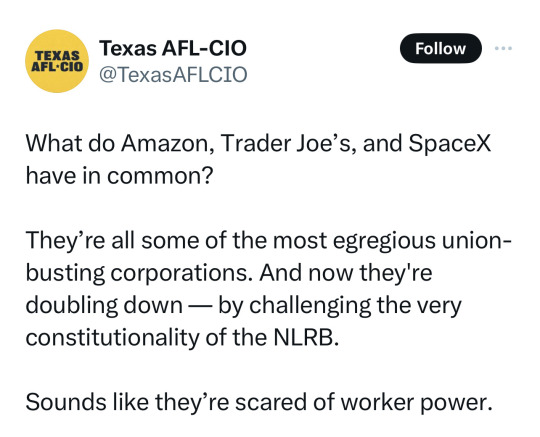

Amazon argues that national labor board is unconstitutional, joining SpaceX and Trader Joe’s
Amazon is arguing in a legal filing that the 88-year-old National Labor Relations Board is unconstitutional, echoing similar arguments made this year by Elon Musk’s SpaceX and the grocery store chain Trader Joe’s in disputes about workers’ rights and organizing.
The Amazon filing, made Thursday, came in response to a case before an administrative law judge overseeing a complaint from agency prosecutors who allege the company unlawfully retaliated against workers at a New York City warehouse who voted to unionize nearly two years ago.
In its filing, Amazon denies many of the charges and asks for the complaint to be dismissed. The company’s attorneys then go further, arguing that the structure of the agency — particularly limits on the removal of administrative law judges and five board members appointed by the president — violates the separation of powers and infringes on executive powers stipulated in the Constitution.
The attorneys also argue that NLRB proceedings deny the company a trial by a jury and violate its due-process rights under the Fifth Amendment. (source)
ICYMI, this is a case of corporations going, “7th Amendment Protections for me, but not for thee.”
It is strongly worth noting that in 2018 the John Roberts Court ruled 5-4 that companies can use forced arbitration clauses to stop people from joining together to fight workplace abuses - in effect denying individuals their 7th Amendment protections.
Subsequently, binding arbitration clauses used by corporations has proliferated; sneaking into all manner of common legal documents: personal banking applications, ordinary car loan applications, furniture purchases, and more. This is, unsurprisingly, a direct violation of the 7th Amendment that guarantees HUMAN BEINGS AND PEOPLE the right to a jury trial in certain civil cases and inhibits courts from overturning a jury's findings of fact. Republicans and SCOTUS are perfectly okay with corporations having more rights than workers and using forced arbitration to block people from having access to jury trials—but God forbid if corporations don’t have their right to a jury trial.
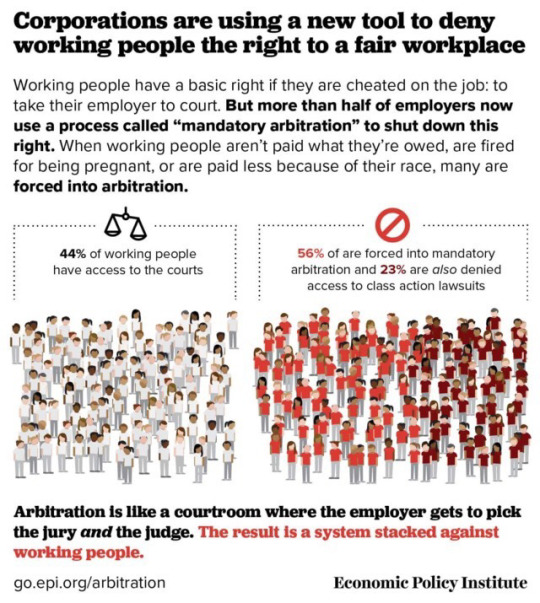
This legislative push to bestow corporations with more rights than people, while simultaneously taking away rights from human beings, has been nothing if not thoroughly and methodically done. At this rate, no corporation will ever need to fear a class action lawsuit again.
Amazon, SpaceX and Trader Joe’s are union busting.
But this latest case against the NLRB isn’t just an attack on labor and worker’s rights, it’s a fascistic attack on the very heart of fairness and democracy itself.
#politics#amazon#7th amendment#forced arbitration#spacex#trader joes#nlrb#workers rights#class action lawsuits#labor unions#union busting#collective bargaining#labor law#labor rights#scotus#john roberts court#john roberts#republicans are evil
101 notes
·
View notes